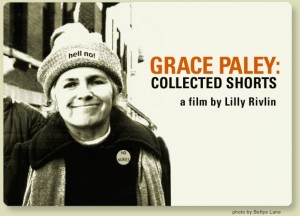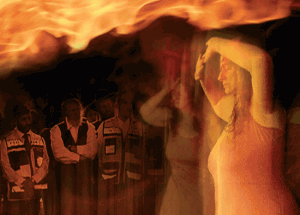
by Amy Stone
Feminists in Focus: Reporting back from the New York Jewish Film Festival ‘Grace Paley: Collected Shorts’ and ‘As Lilith’
At the 20th New York Jewish Film Festival, presented by The Jewish Museum and the Film Society of Lincoln Center (through Jan. 27).
“Grace Paley: Collected Shorts”
How does a Jewish feminist filmmaker celebrate success, long time a-coming? In the case of Lilly Rivlin, generously.
In black boots and glittering red jacket, Rivlin was the proud mother, making sure everyone involved with “Grace Paley: Collected Shorts” got credit. She turned the New York Jewish Film Festival post-screening Q&A into a moment of oral history, calling on anyone in the audience with a story to tell about Grace Paley to share it. And they did.
The 75-minute film. completed in 2010, is a valentine to the beloved writer, anti-war activist, wife and mother who died of breast cancer in 2007 at the age of 84. A film needs tension, Rivlin said during the post-film discussion, as reason for including writer-critic Vivian Gornick’s crack that Paley was no feminist.
Aside from that one remark, there’s no tension, just appreciation in interviews with political activists, writers, past students at Sarah Lawrence, her second husband, her daughter. Best of all is the diverse footage of Paley speaking for herself and in action. There’s the infamous PEN writers’ meeting chaired by Norman Mailer. The man shamelessly relegated women to the sidelines while elevating then-Secretary of State George Shultz under Reagan to center stage. Of course Paley was part of the women’s protest.
Down to earth, born in the Bronx of Jewish socialists exiled by the czar, Paley’s slim output of short stories was a unique voice in the 1950’s – stories of ordinary women, mostly ordinary New York Jewish women who could’ve been her relatives. The dialogue reads as if the words just flowed out of her. So it’s a shock to see a shot of one of Paley’s manuscripts – typed then written over, reworked and reworked. A surprise to see how hard she must have worked to make her work look simple.
Writer, political activist and mother as storyteller. One of the film’s highlights is Paley recalling when she was jailed for a sit-in, sent to the women’s house of detention in Greenwich Village. She remembers how she loved waving to her children during her brief incarceration as they went off to school each day.
Maybe Gornick’s claim that Paley was no feminist was an unsisterly response to Paley’s happy life with men. As Paley says on camera, she was always living with a man – married at 19 to cameraman Jess Paley, then married to Robert Nichols, whom she met in the anti-Vietnam War peace movement.
Rivlin’s “Grace Paley: Collected Shorts” is an appreciation of a life richly and fully lived. Although she includes home movies made near the end of Paley’s life, Rivlin omits any mention of Paley’s final fight against cancer, how she took on the last battle and whether she wrote about it. Judging by the film, until then, Paley seems to have taken on all her battles with egoless presence.
Seeing Paley brought back to life on film certainly inspires a sense of pride in those who were with her for enormous changes at the last minute. After the screening, on the endless line to the ladies room, one woman expresses disappointment that no one recognizes her as a participant in the PEN protest. The rest of us feel inspired to strike out for change. We talk of integrating the seemingly empty men’s room. But we need Paley to lead us.
“Grace Paley: Collected Shorts” is being shown at Jewish film festivals around the country. The JCC in Manhattan is screening the film on March 8 at 7:30 p.m.
For updates on screenings of “Grace Paley: Collected Shorts:” check out www.gracepaleythefilm.com and www.jewishfilm.org.
Wednesday, Feb. 16th., San Diego Jewish Film Festival, ***
Thursday, March 3rd George Washington U., Washington, D.C. ***
Saturday, March 5th, Mendocino Coast Jewish Community Center
Tuesday, March 8th, JCC in Manhattan *** Reception to follow
Wednesday, March 9th, NCJF, Wasserman Cinematheque @ Brandeis U. ***
March 24-April 10th, Minneapolis Jewish Film Festival
April 26/28th, Jacobs Burns Film Center/ Westchester Jewish Film Festival, 364 Manville Rd., Pleasantville, NY ***
*** Director present
“As Lilith”
 Of course a correspondent from Lilith is going to be favorably disposed toward a woman named Lilith who’s up against Israel’s self-selected guardians of traditional Jewish burial. These Orthodox men with yarmulkes and cell phones refuse to let her cremate her 14-year-old daughter, who has committed suicide. They’re using the courts, the child’s father, and whatever else might work to stop her from doing what goes against Jewish tradition but is perfectly legal in Israel.
Of course a correspondent from Lilith is going to be favorably disposed toward a woman named Lilith who’s up against Israel’s self-selected guardians of traditional Jewish burial. These Orthodox men with yarmulkes and cell phones refuse to let her cremate her 14-year-old daughter, who has committed suicide. They’re using the courts, the child’s father, and whatever else might work to stop her from doing what goes against Jewish tradition but is perfectly legal in Israel.
This strange, long-haired lumpy woman, who looks for all the world like an aging Israeli hippy, has taken the name Lilith and is a member of an arcane tribe of one. Her name is enough to prove her evil nature to the ZAKA volunteers, whose rescue organization responds to terrorism and disasters with the motto “saving those who can be saved, honoring those who cannot” in accordance with Orthodox Judaism. These are the same Israeli men who collect scattered bits of flesh after bombings so the complete body can be buried.
Mother Lilith certainly has the right to cremate her daughter’s body but these unsympathetic Orthodox men may have a point in wanting a traditional burial. Everyone claims concern for the dead girl – a pretty teenager with freckles, long brown hair and hazel eyes. No one other than Lilith’s son and a mental health worker seem to have much concern for this isolated woman.
In one of the film’s strongest moments, the ZAKA men corner the mental health worker in her office, questioning Lilith’s sanity. The woman, who is both religious and a consummate professional, makes it clear that Lilith is not mentally ill and she’s entitled to her decisions.
“As Lilith” is not the usual dichotomy of Israel’s non-religious versus religious or modern woman versus religious establishment. In its own strange way, it’s one belief system against another, with the minority under siege.
“As Lilith” certainly raises the issue of the need for human rights for those outside the mainstream, those most in need of rights. Lilith emerges as a woman desperately alone – a woman so in need of someone to talk to that she hangs on the line of the radio talk show host who is both exploiting her notoriety and refusing to talk to her for not having read her daughter’s diary notations written just before committing suicide.
Eytan Harris’s 2010 documentary, which looks unnervingly like a feature film with strikingly skilled actors, makes it hard to sympathize with either side. And that’s its strength.